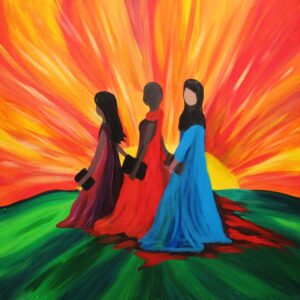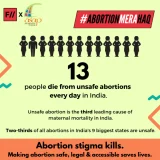Ten Thoughts On Women: On The Eve Of Women’s Day 2014
As we gear up to join the global celebrations for International Women’s Day, we are happy to announce that this month we will be writing blogs that explore women’s autonomy.
In the introduction to her book The Second Sex (1949), Simone de Beauvoir writes that women:
“have no past, no history, no religion of their own… They live dispersed among males, attached through residence, housework, economic condition, and social standing to certain men – fathers or husbands – more firmly than they are to other women. If they belong in the bourgeoisie, they feel solidarity with men of that class, not with proletarian women; if they are white, their allegiance is to white men, not to Negro women… The bond that unites her to her oppressors is not comparable to any other. The division of the sexes is a biological fact, not an event in human history.”

As we understand better the intersection of gender with class, caste, race, religion and other hierarchical institutions, we understand that feminism must constantly address these issues in order for women to unite and organize against patriarchy. For women to be autonomous and equal not only to the men in their class or community, but to other women in the world, it is important to understand how these institutions have oppressed both men and women, and how patriarchal regulations have disadvantaged women unequally.
On the eve of Women’s Day we are sharing on our social media pages: Facebook and Twitter, stories, interviews, blogs, videos, podcasts, and articles on how to understand women and feminism at this intersection.
For those of you who like blogs better, here they are:
1. Women And Resistance: A podcast from Alternative Radio, which features an interview with Arundati Roy, writer and analyst who speaks about women’s role in demanding justice for their communities, and how often sexual violence is used against them as a weapon in response.
2. Why Birth Is A Feminist Issue: A short blog on how autonomy in women’s lives must extend to her reproductive experiences, and give her the power to determine if and when to continue or terminate a pregnancy.
“The sexist stereotype of the “good mother” as selfless and uncomplaining has fostered a blanket silence about birthing. In the hard fight for abortion rights—now under renewed rightwing attack—the feminist movement of the last five decades has mostly bypassed women’s rights in childbirth. Until recently, feminist discourse has largely ignored them.”
3. Gender Performance: But then women are often told that they “have to” be mothers. How do we understand gender stereotypes better? Here is a 3-minute interview with Judith Butler, on how gender is performative, and how our role-playing is crucial to our perception of who is a woman or a man, who is straight or gay, and how we learn to feel threatened by non-conformation.
4. Education for Girls: This interview is a little long, but worth your time. Malala Yousafzai speaks to Christiane Amanpour on the power of education. Listen to the introduction by US Ambassador Samantha Power, as she speaks about how
“Education is a not a privilege, but a right that helps take advantage of other rights.”
5. Feminism and Science: While education is a right, is the institution of education free from patriarchy? Here is an interview with scientist, Chayanika Shah, who explains why feminism is crucial to the sciences.
6. Women and the Work Force: All is not yet well for educated women who desire to be part of the workforce. In this podcast, Barbara Ehrenreich a social critic, journalist, and activist, talks about the discrimination within the workforce.
7. Women in Cinema: Films are powerful, and can change the stereotypes that society at large holds of women. In this interview, Indian Film Actress Shabana Azmi, discusses among other things,, how stereotypical portrayals do women a disservice.
“When it comes to women, for instance, even the titles of earlier films like Main Chup Rahoongi (I will remain Silent) suggest that keeping silent is a virtue for women. Women have largely been played in stereotypical roles, either as the suffering wife, or the forgiving mother, or the understanding sister. Until these stereotypical roles undergo some kind of progressive transformation in mainstream cinema, the message is not going to be communicated to the larger audience it ought to reach.”
8. Feminism and Race: In the last century, conversations on race has fleshed out the many obvious and the several insidious ways in which racial stereotypes oppress men and women. Here National Public Radio (USA) asks a question: Just who counts as a woman of color, a question that is relevant to Asia as well, where recent violent encounters between ethnic groups have caused women of certain ethnicities to become extremely marginalized.
9. Shibahara Urako – The Story of A Feminist: Sometimes, one story says it all. In this blog from our archives, our partners at Space Allies in Japan, tell the story of a Japanese women who became a leader for women’s health in the country.
10. Are You A Feminist? Here is a geeky blog from Jezebel on really what makes a person a feminist or not, and why irrespective of labels it is questioning the inequalities rather than believing in equality that unites us in a battle against patriarchy.
I’ll leave you with a happy video that shows just how diverse women are. Watch out for the happy little girl at 0:45.
Happy International Women’s Day 2014.






